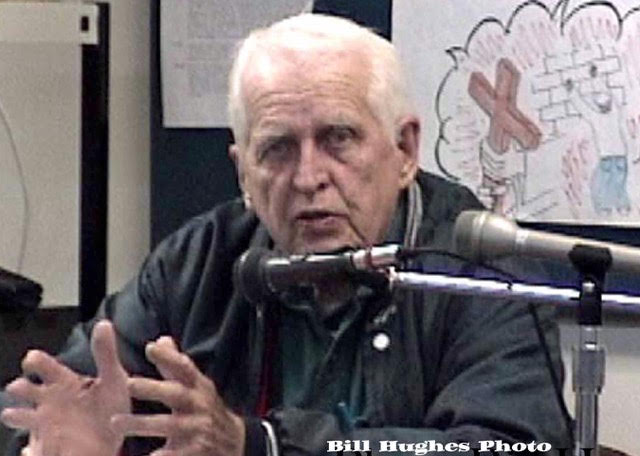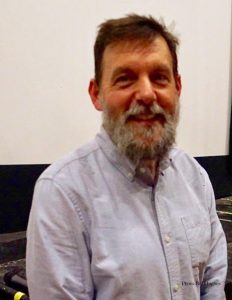Friends,
Below is a review of
1971, a fabulous film which is an intimate look at some of the activists who
dethroned J. Edgar Hoover when they broke into an FBI office in Media, PA. The
director also touches on a draft board raid in Camden, NJ. However, a
much better documentary regarding that subject is THE CAMDEN 28.
Besides seeing
1971, the audience was able to witness a lively cross-examination of Stephen
Sachs, the U.S. Attorney involved in the prosecution of both the Baltimore Four
and the Catonsville Nine. Fifty years later, he is trying his best to
argue that he was right to prosecute and that the activists who destroyed draft
records and actually saved lives were wrong. Sachs really got my ire up
when he wrote an op-ed in THE BALTIMORE SUN “Former U.S.
attorney: conviction, courage and dishonor among 'Catonsville Nine.'”
To suggest that the nine were guilty of dishonor was preposterous.
Following the film,
during a Q and A with Keith Forsyth, the locksmith for the Media FBI break-in,
and Sachs, moderated by Joe Tropea, I challenged the retired U.S.
attorney. I reminded him that he took an oath to uphold the
constitution. However, he never used his office to prosecute anyone
involved in orchestrating an illegal war against the people of Vietnam. Obviously,
the war was immoral, and I argued illegal and unconstitutional. The
constitution makes clear that Congress has the sole authority to declare
war. Even if you accept the bogus 1964 Gulf of Tonkin incident as fact,
U.S. involvement in Vietnam had been going on under presidents Truman, Eisenhower, Kennedy and of course Johnson
without Congress authority.
Also
I pointed out to Sachs what we have learned from the Nuremberg Tribunals. Of
course, Nuremberg was flawed as it was victor’s justice. For example, the
United Sates was not prosecuted for destroying civilian populations in Hiroshima
and Nagasaki. Nevertheless, most observers are aware of the ruling that
you can’t obey illegal orders. But also we learned from the Tribunal that
citizens must challenge a government committing illegal acts. The Vietnam
War was an illegal act, and the Baltimore Four and the Catonsville Nine
challenged the government.
In response, Sachs
said yes, he did take an oath, but added that federal courts were not equipped
to prosecute the warmongers. I yelled out that the courts prosecuted the
peacemakers, but not those waging an illegal war. He stated that he did
not say that the courts are not set up to prosecute war crimes. I am not
aware of any federal court which prosecuted the architects of the war. While
the former prosecutor admitted he was opposed to the war, this opposition never
surfaced in a courtroom.
Kagiso, Max
Anti-war movement film
‘1971’ at Charles Theatre

The
anti-war film, “1971,” was shown Monday at the Charles Theatre before a large
audience. The compelling documentary, which focused on a break-in by antiwar
activists of an FBI office in Media, PA, on March 8, 1971, was produced by
Johanna Hamilton. It will show only this one time in Baltimore. It was part of
the “50th Anniversary of the Catonsville Nine’s Resisting War Film Series.”
For many reasons, the “Catonsville Nine” case became the “cause
celebre” for the non-violent war and resistance movement. Two of its members,
both Catholic priests, Dan Berrigan, a Jesuit, and his brother, Phil, became
well-known public figures as a result of this daring action. Phil
Berrigan later left the priesthood. He was a member of the Josephite Fathers
and a WWII veteran who fought in the Battle of the Bulge.

Phil Berrigan
Around
that same time, the hierarchy of the Catholic Church in the U.S. was extremely
conservative and mostly went along with the Vietnam War, as many of them did
with the more recent Iraq conflict. The reactionary Cardinal Francis Spellman
of NYC was their titular leader at that time of the Vietnam War. He never saw a
war or weapon system he couldn’t bless.
After
the murder of President John F. Kennedy on Nov. 22, 1963, the U.S. buildup of
combat troops in Vietnam increased dramatically. First, under President Lyndon
B. Johnson and then continuing under Richard M. Nixon’s demented presidency
(1969-74). The latter barely escaped impeachment before resigning his office.
The
actor Martin Sheen, also an antiwar activist, was a colleague of Phil Berrigan.
He attended his funeral in Baltimore, in 2002. Sheen labeled the “Catonsville
Nine” action, the “single most powerful antiwar act in American history.” I’m
inclined to agree with Sheen, but others – a minority – have seen it
differently.
The
backdrop for the “Draft Resistance Movement,” especially on the Catholic Left,
was the illegal and immoral Vietnam War (1963-1975). Over 58,000 of our finest
sons and daughters died in that lethal conflict, with 303,000 more casualties.
Congress had failed to “declare war,” as required under the U.S. Constitution,
instead of the pro-war elements in the government, the Military-Industrial
Complex, and in “Deep State,” relied on the legally-suspect “Gulf of Tonkin
Resolution” to justify their actions. The Resisters considered the war not only
immoral but illegal as well.
Getting
back to the film, the “Washington Post,” opened the floodgates by publishing
most of the stolen files from the break-in, at Media, PA. Other newspapers,
like the “New York Times,” and a host of TV stations, soon joined in by also
publishing the material seized. The FBI, under its then czar-like Director, J.
Edgar Hoover, was also outraged by the newspapers’ collective actions and
threatened prosecutions.
The
highly-secret cache revealed the FBI was running “a vast and illegal regime of
spying and intimidation of Americans, who were exercising their First Amendment
rights.” The FBI’s name for its patently illegal operation: “COINTELPRO.”
Media,
PA is a town located on the outskirts of Philadelphia. The activists revealed
in the film that they chose it as a site for a break-in because this particular
FBI office was located in a building with little or no security. They carefully
planned the break-in. They were never caught or prosecuted for their offenses.
Nobody squealed either. They were careful to wear gloves and left no
fingerprints. The statute of limitation has long since passed for any criminal
prosecution of the defendants to take place.
One
of the participants in the Media action was Keith Forsyth who actually “broke
the lock,” to get into the building. He was present at the viewing of the
documentary at the Charles. Forsyth, also a member of the “Camden 28” action,
took part in the lively Q&A session that followed the film’s presentation.
Steve Sachs, former U.S. Attorney for Maryland, (1967-70), joined in the
post-movie discussion as well.

Keith Forsyth (l) and Steve Sachs (r)
Mr.
Sachs was the federal prosecutor in charge of the Catonsville Nine case,
although he wasn’t one of its “trial attorneys.” He did, however, personally
prosecute another case, the “Baltimore Four,” (10.27.67), which did involved
destruction of government draft records by “pouring blood on them” at the
Customs House. One of the “Baltimore Four” was in the audience, the poet, David
Eberhardt. Another defendant, in that case, was the late Phil Berrigan.
Moderating
the Q&A session was Joe Tropea, who co-produced the popular documentary,
“Hit & Stay,” which covered not only the Catonsville Nine case but other
antiwar actions during that same period. There were reportedly 271 draft board
raids in the U.S. between 1968-71. “Hit & Stay” was also shown at the
Maryland Film Festival, along with Tropea’s “Sickies Making Films,” which dealt
with film censorship in Maryland.

Joe
Tropea
The
spirited Q&A session went on for about an hour. Folks in the audience, like
local peace activist, Max Obuszewski, had more than one question to ask, as did
others from the Peace Community.
Sachs
said, with respect to the break-ins and destruction of draft records cases,
that you “open the door to a lawless society,” if you pick and choose what case
to prosecute based on the motives, no matter how honorable, of the defendants.
Motives, he added, are important only at sentencing for the court to consider,
however, they have no role to play in the bringing of a criminal action.
Forsyth
countered by saying, it all comes down to what is the “right or the wrong”
thing to do for an individual under the circumstances. A person has to decide
for him or herself: “Am I on the right or wrong side of humanity on this
issue?”
Citing
the desperate situation that the Jews found themselves in WWII, in France,
under the “Vichy Regime” (1940-45). Forsyth said the democratically sourced
government in that country had decided “to round up” its Jewish population for
deportation back to Nazi Germany. An individual back then, Forsyth underscored,
had to decide for himself either to “resist those laws,” or to go along with
them. Were those laws – right or wrong? “It was that simple,” concluded
Forsyth.
The
“Camden 28” case also came under discussion. This anti-draft board action took
place in 1971, in Camden, NJ. All 28 defendants were found “not guilty” by a
jury in 1973. Forsyth said that a few of the jury members told him after the
acquittal, that they decided on a “not guilty” verdict because they believed
the “Vietnam War was wrong.”
It
also turned out that one of the 28 defendants was “an informant” for the FBI
and that he had been involved in the “planning and training perspective” of the
action. That was more than enough to convince the jury to acquit the
defendants. Some have called the verdict in the “Camden 28” case, a classic
example of “jury nullification!”
Finally,
the presentation of the film, “1971,” at the Charles, in light of the current
political situation in this country, was, indeed, a fitting way to round out
the 50th anniversary of the “resisting war films series.”
Bill
Hughes is a native of Baltimore. He’s an attorney, author, professional actor
and hobbyist photographer. His latest book is “Baltimore Iconoclast” and it can
be found at: http://bookstore.iuniverse.com/Products/SKU-000076922/Baltimore-Iconoclast.aspx.
Contact the
author.
Donations can be sent
to the Baltimore Nonviolence Center, 325 E. 25th St., Baltimore, MD
21218. Ph: 410-323-1607; Email: mobuszewski2001 [at] comcast.net. Go to http://baltimorenonviolencecenter.blogspot.com/
"The master class
has always declared the wars; the subject class has always fought the battles.
The master class has had all to gain and nothing to lose, while the subject
class has had nothing to gain and everything to lose--especially their
lives." Eugene Victor Debs
No comments:
Post a Comment